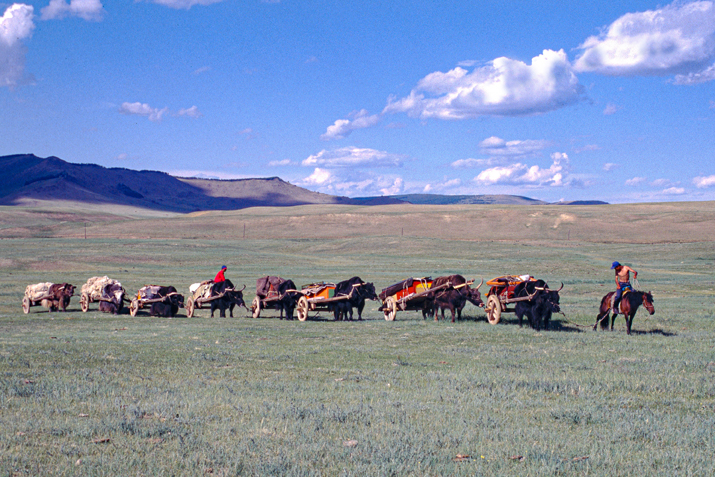
No money no truck
N 51°21'785'' E 099°21'046''
Day: 150
Sunrise:
09:24
Sunset:
17:16
Total kilometers:
1146
Soil condition:
Ice, snow
Temperature – Day (maximum):
minus 28°C
Temperature – day (minimum):
minus 30°C
Temperature – Night:
minus 36°C
Latitude:
51°21’785”
Longitude:
099°21’046”
Maximum height:
1475 m above sea level
“No money, no truck,” says Ayush sourly. In the meantime, Saraa has called her cousin and explained to him that she agreed a price of 70,000 Tugrik for the trip with him weeks ago. “I never said that,” he denies the sum. “Tanja and Denis took your statement as the basis for their calculations and brought money from Mörön to Tsagaan Nuur accordingly. You’re getting them into trouble now. “Then they’re not going to the taiga. I don’t care about that. If they don’t pay, they should look for another truck. They won’t get mine,” he answers her on the phone.
After Saraa informed us of the negative outcome of her phone call, we consider offering Ayush 100,000 Tugrik (€57). “Maybe he’ll agree to this compromise,” I say. “He’ll definitely do that,” Tanja is sure, takes the money and goes to Ayush’s log cabin to negotiate with him directly. It only takes 15 minutes for Tanja to return to the yurt, shaking her head and laughing. “What’s so funny? Did he go for it?” I ask. “He’s crazy. I think he’s gone completely mad now,” she says. “How? Don’t keep me in suspense like this.” “He now wants 133,000 tugrik (€76) for the normal trip to the Tuwa and an additional 40,000 tugrik (€23) to fetch the wood, plus 30,000 tugrik (€17) for salaries. So the price hasn’t gone down, it’s gone up from 70,000 tugrik (€40) to 202,000 tugrik (€116),” she replies.
Defiantly, Tanja sets off to stop every truck she sees in the village and ask if they are taking us to the taiga. When she has asked at least five truck drivers, she comes back disappointed. “Nobody wants to drive into the taiga. Most of them don’t own an off-road truck or drive on behalf of someone,” she reports. “Ayush’s neighbor also has a four-wheel drive truck. Why don’t you ask him,” I suggest. “I will,” she replies and trudges off through the snow. Unfortunately, he is not prepared to take us to the taiga either. Saraa tells us the reason for this. “Ayush was mayor of Tsagaan Nuur for 45 years. He still has great influence. His neighbor doesn’t want to fall out with him under any circumstances. Others don’t want to incur his wrath either,” she explains. “Aha, so that’s the reason. But there must be someone who will drive us at a fair price,” I reply. “I’m here in Mörön 300 kilometers away from you. My hands are tied. You’ll have to arrange your own transportation. However, Shagai also told me about another problem. There are companies that are willing to pay up to a million for a single trip to the taiga.” “What, a million tugrik? For what?” I ask in horror. “Jade has been discovered. They transport this gemstone with the trucks from the taiga,” she explains, whereupon we see our chances of moving into the taiga with our yurt dwindle.
It is already dark when I go to Ayush in the log cabin and make him another offer due to the new situation. To avoid any misunderstanding, I have Saraa on my cell phone to translate for me. “Please tell him that our final offer is 150,000 Tugrik including all costs,” I explain to her and pass the phone to Ayush. “What? My price isn’t too high! It’s normal! I won’t drive for 150,000 Tugrik!” he yells at Saraa through the phone. Tsendmaa, who is sitting at the stove cooking dog food for Jack from flour, water and leftovers, tells me to talk to her adoptive father in a quiet minute.
It is already 9 p.m. when Tsendmaa comes into our yurt with a sad face. “We’ll have to wait until tomorrow, today my father is too upset about the whole thing. He’s a good man at heart. He has adopted seven children from different provinces over the course of his life,” she explains, drawing the provinces on a piece of paper.
We realize that just because you adopt children is no indication that you are a good person. Ayush was a politician. He deliberately took children from various provinces in order to increase his influence among others. In Mongolia there is a saying that the more people you know, the more influential you are. Nothing has changed to this day. Everyone tries to spread their network of contacts as far as possible across the country. Saraa has a relative or friend almost everywhere where she can spend the night or who can or has something that can be used when the time comes. It’s similar with Ayush. His children are encouraged to help out in the business and in the family from an early age. That’s fine too. However, we have the feeling that the adopted children of Tseden-ish and Ayush live under constant pressure. There are no hugs and, as far as we can tell, no praise. They have to function and must not make decisions alone. They are conditioned to dependency. The 28-year-old civil engineer Tsendmaa is now sitting sadly next to us, drawing stick figures in a notebook, embarrassed and at a loss for words. We are curious to see what tomorrow will bring and are wondering how we can solve this tricky situation?
We look forward to your comments!

